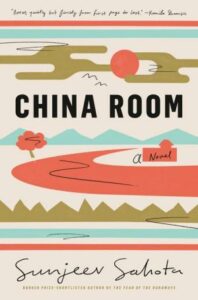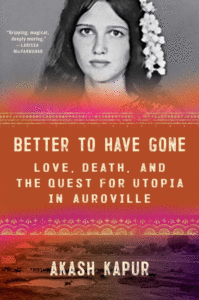
Sunjeev Sahota’s China Room, Grady Hendrix’s The Final Girl Support Group, S. A. Cosby’s Razorblade Tears, Kristen Radtke’s Seek You, and The Letters of Shirley Jackson all feature among the best reviewed books of the month.

1. China Room by Sunjeev Sahota
(Viking)
9 Rave • 7 Positive • 3 Mixed
Read Sunjeev Sahota on the struggle and privilege of growing up between two countries here
“There is a hint of the Shakespearean bed trick about the plot that unfolds, although it is only lightly sketched, as with much else in the novel … There is a scrupulous subtlety about that way that Sahota refuses to let his historical characters act as though they are in a historical novel … rather than feeling confined by whatever real-life elements informed its creation, [China Room exists in a far more indeterminate, diffuse dimension, at times taking on an almost fairytale quality. In his three novels, Sahota has demonstrated an ambitious need to adapt the specific and concrete to something less easy to pin down, complete with all the gaps and ruptures that life provides and art makes, even for a moment, tangible.”
–Alex Clark (The Guardian)
2. The Final Girl Support Group by Grady Hendrix
(Berkley)
9 Rave • 5 Positive • 1 Mixed
Read some rapid-fire book recs from Grady Hendrix here
“That sense of collective female triumph is what makes Grady Hendrix’s new novel…such a great read. Hendrix…excels at writing horror humor … His characters are funny and real, though at least one will definitely lose a limb at some point … Though the final girls’ plight has all the scares of great horror fiction, there is an element of truth in their situation that will be recognizable to anyone who has experienced real trauma.”
–Danielle Trussoni (The New York Times Book Review)
3. Razorblade Tears by S. A. Cosby
(Flatiron)
10 Rave • 3 Positive
“Cosby’s drive to expand the chorus of voices representing the South is on full display in his follow-up, Razorblade Tears … The novel’s DNA may seem familiar to readers of Blacktop Wasteland or Joe R. Lansdale’s Hap and Leonard series, but its composition feels utterly unique, as if the elements of one’s waking life were scrambled in a dream … Riding shotgun with the violence, though, is also great beauty—in descriptions of the grief of a community, in the fathers’ stirring awareness of the true meaning of love and even in Cosby’s reverence for the vibrant natural world … The contradictions in Razorblade Tears suggest the deeper moral ambiguity in this and all vigilante narratives. Unlike another Shakespearean character, who famously said revenge is a dish best served cold, these Southern fathers are well aware of the paradoxes of their mission, even as they are compelled to finish it in the name of justice for their boys.”
–Paula L. Woods (The Los Angeles Times)
4. Wayward by Dana Spiotta
(Knopf)
8 Rave • 3 Positive • 3 Mixed
Listen to an interview with Dana Spiotta here
“… furious and addictive … I diagramed Wayward on a paper napkin to show a friend, trying to explain the novel’s hold on me. The lure isn’t just voice or plot … Sam turns out to be an ideal guide. She’s rash, funny, searching, entirely unpredictable, appalled at her own entitlement and ineffectuality—drawn with a kind of skeptical fondness … The local pleasures of Spiotta’s writing are sharp, and many: Sam recalling the narcotic pleasure of holding her daughter as a baby, her painful longing and loneliness for it now. Or smaller moments … So much contemporary fiction swims about in its own theories; what a pleasure to encounter not just ideas about the thing, but the thing itself—descriptions that irradiate the pleasure centers of the brain, a protagonist so densely, exuberantly imagined, she feels like a visitation.”
–Parul Sehgal (The New York Times)
5. Nightbitch by Rachel Yoder
(Doubleday)
5 Rave • 9 Positive
Read Rachel Yoder on navigating chronic pain through storytelling here
“… witty and bizarre … what makes Nightbitch stand apart from the usual early motherhood stories, teeth and all, is that Yoder doesn’t focus on how hard being a new mom is, nor does she romanticize the experience. Instead, by blending the real and the surreal, Yoder shows a woman following her primal instincts and becoming her own person—or dog, I should say—outside of cultural norms. And in doing so, she finds freedom … Be warned—the novel is dark, gory, violent. But Nightbitch is fantastically rendered. Yoder’s voice is razor-sharp, poignant and wry. While it’s seeped in mythical qualities, the haunting premise doesn’t seem that far-fetched. Nightbitch is a stunning modern feminist fable that shouldn’t be missed.”
–Jordan Snowden (The Seattle Times)
**

1. Seek You: A Journey Through American Loneliness by Kristen Radtke
(Pantheon)
11 Rave • 2 Positive • 1 Mixed
Listen to an interview with Kristen Radtke here
“Kristen Radtke’s Seek You: A Journey Through American Loneliness defies categorization—and it does so in spectacular fashion. At once a memoir, a personal essay about loneliness, an exploration of the science of solitude and its effects, and an invitation to come together in a world built to separate us, Seek You looks at isolation as a problem and investigates where it comes from, how it shapes us, and why we should battle against it … In Seek You, Radtke’s cuts to the marrow of our inner lives as well as our online lives and public selves to explore the ways in which community, interaction, and even touch affect us, especially when these elements are missing … The beauty of Seek You is that it feels like a communal experience. Reading this book is reading about ourselves and our lives … Seek Youaccomplishes a lot and its unique hybrid nature makes it a must-read. However, perhaps the most important thing it accomplishes is telling everyone that they aren’t alone in their loneliness, and that could be the first step into ending the loneliness epidemic.”
–Gabino Iglesias (NPR)
2. This is Your Mind on Plants by Michael Pollan
(Penguin Press)
4 Rave • 9 Positive • 2 Mixed
“Readers of How to Change Your Mind will recognize Pollan’s thoughtful and scientific approach to the subject of psychedelic drugs and altered states of consciousness. This Is Your Mind on Plants is an entertaining blend of memoir, history and social commentary that illustrates Pollan’s ability to be both scientific and personal. By relying on contextual history and focusing on three popular, if misunderstood, drugs, Pollan challenges common views on what mind-altering drugs are and what they can accomplish.”
–Sarojini Seupersad (BookPage)

3. Better to Have Gone: Love, Death, and the Quest for Utopia in Auroville by Akash Kapur
(Scribner)
5 Rave • 6 Positive
“… extraordinary … a riveting account of human aspiration and folly taken to extremes … It’s a complex tale made somewhat more fathomable by the treasure trove of letters, diaries, and interviews at his disposal … poignant passages … Kapur’s prose is nimble and fluid, as his attitude toward his material shifts from dismay to anger to anguish and, finally, to hope … Despite everything, Akash and Auralice stubbornly cling to a vision of a better world. It’s a vague yearning that the author can’t quite put into words. Readers may be pardoned for being more skeptical.”
–Dan Cryer (The Boston Globe)
4. The Letters of Shirley Jackson, ed. by Laurence Jackson Hyman
(Random House)
5 Rave • 5 Positive
Read an excerpt from The Letter of Shirley Jackson here
“Her fiction, full of misanthropy, madness and murder, tends to be viewed through the lens of her personal torments and, more generally, of the misogyny of the age. What is striking about Jackson’s letters, however, is that while they testify to pretty outrageous domestic double standards (Hyman was a man unwilling to even heat up a bowl of soup for his lunch), they show very little sign of unhappiness. The mood of the missives is buoyant, garrulous and eager to amuse, and while Jackson often seems stressed and exasperated, she’s rarely despairing. The merry anarchy in the world she evokes has a lot in common with the scenes evoked in her hilarious motherhood memoirs … The labors of domesticity and artistry are fused in these letters in a way that seems to me unique.”
–Sam Sacks (The Wall Street Journal)
5. Fox & I: An Uncommon Friendship by Catherine Raven
(Spiegel & Grau)
4 Rave • 6 Positive • 1 Mixed
Read an excerpt from Fox & I here
“What emotional vocabulary can express both the joy and the doubts she experienced devoting copious time and love to a wild creature? This fanciful, literate, unsentimental and yet deeply felt memoir is her answer … Every story demands a language of its own and Raven chooses a fluid, swift-moving style, which takes some getting used to … She’s a superb nature writer, who also delves into cultural topics, such as the fox icons found in Inari temples in Japan … More than most books, Raven’s sets out unique, even eccentric, terms, and she uses fictional techniques to round out her account, including sections told from Fox’s perspective. If a reader is willing, the experience of journeying alongside her as she lives with Fox and meditates about him is extremely rewarding … Fox & I will appeal to those who despair about human depredation of the natural world and sense climate change as the looming, existential threat to life. But Raven’s book isn’t a treatise, it isn’t a call to arms, it isn’t political. Perhaps it is best understood as a plea for understanding.”
–Claire McHugh (The Washington Post)

